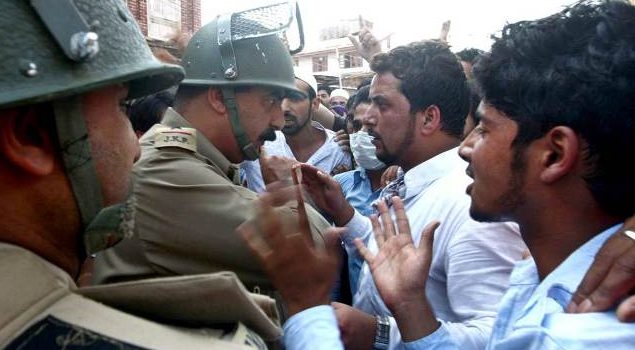By Bobby Naqvi,
The Indian Right has always used Muslims as a stepping stone to power in Delhi and elsewhere since the 1930s. Almost every organisation – from RSS, BJP, VHP, Bajrang Dal and even Shiv Sena – has targeted Muslims, not just because they despise the community. But also because they need a punching bag, a common enemy to unify the mythical ‘Hindu Ummah’.
And they have succeeded in Gujarat, MP, Rajasthan and Haryana. In Uttar Pradesh, the Right pitted Jats against Muslims and won handsomely. In Haryana too, the Jats rallied behind the BJP. In Gujarat, Modi famously demolished Congress’ social groupings and managed to unify Patels, Dalits, OBCs and Tribals by constantly hammering a point – that the biggest existential threat Gujaratis face is from Muslims. Never mind that most people don’t understand how. But it worked.
So, why Muslims allow themselves to be a punching bag? The answer is complex but not beyond comprehension. The biggest drawback this community faces is its inability to assert itself by deploying democratic means – protests, community sammelans, marches etc.
For example, in recent months, four Muslims were attacked and killed by Gau Rakshaks and more were assaulted brutally. But Muslims failed to raise their voice. Their leaders, their mullahs couldn’t offer more than a few muffled voices.
In contrast, just one attack in Una has rallied tens of thousands of Dalits in Gujarat. They have launched a Padyatra which will culminate in Una on August 15th. At each stop, the Dalits are taking oath not to touch dead cows or clean trash, a mini uprising which led to resignation of a CM and forced the Prime Minister to break his silence.
Secondly, the community lacks the will to organise itself and hold social gatherings. So, while you have Aggarwal Sammelans, Kshatriya Mahasabhas and Dalit Manchs, the Muslims lack a similar platform. Muslims have none. They do, however, gather for religious functions. That is where the problem lies – instead of discussing social and economic issues affecting their community, they gather in Ijtimas to discuss and hear about religion, something they do on a daily basis at home, at mosques and at madrassas. Social issues then take a backseat and all the community gets is an overdose of religion.
Politically too, Muslims have always played a second fiddle by rallying around parties which bank on non-Muslim social groupings. For instance, in Uttar Pradesh, Muslims have supported the BSP, a party of Dalits. On other occasions, they have voted for SP, a party of Yadavs and other OBCs. Congress, meanwhile, has used and abused them since independence. Having an exclusive Muslim political platform is tricky as it will draw attacks from Right and Centre both.
Fourth, the Indian establishment is sensitive to Muslim dissent and mobilisation. That is one reason why governments are reluctant to allow student elections in universities with sizeable Muslim presence. Also, there is a widespread perception in the community that police and administration’s response to Muslim protests would be disproportionate. For example, many in the community cited Jat protests in Haryana, saying a Muslim demonstration of similar nature would have been disastrous with a massive loss of lives.
Still, I believe, there are ways Muslims can assert their rights through democratic means.
Expecting Prime Minister Modi to speak for you is idiotic, given his record and political compulsions.
Here are three things Muslims can do:
a) Rise, rally, speak up. If you don’t, no one will.
b) Not sure? There’s one more way. If you can’t fight your enemy, join them. Disarm the Right by rallying around the BJP.
c) Bullshit? Not good? Then be happy where you are.
Courtesy: MM

